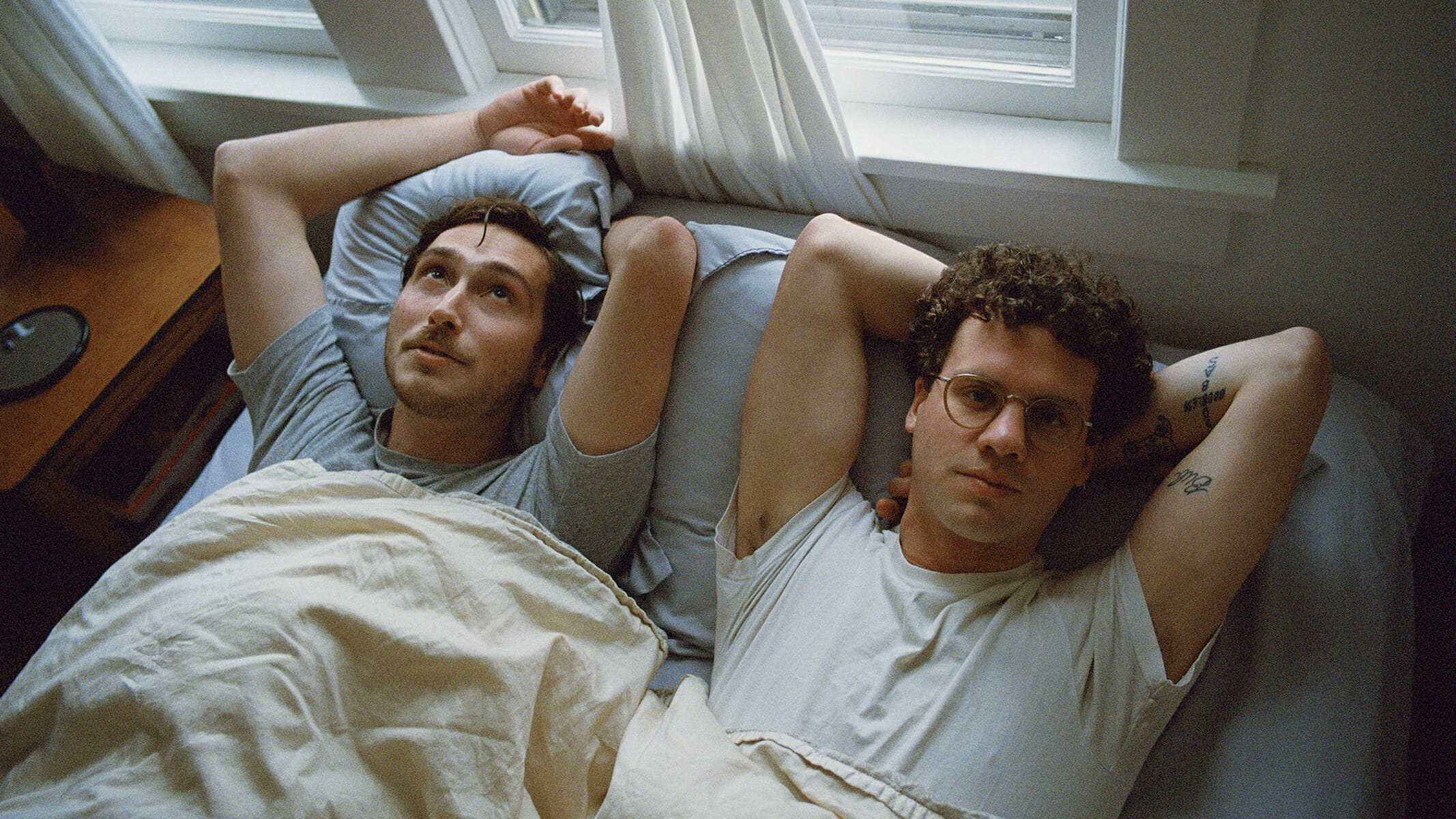For Whitney, Some Things Just Never Change
We chat with Max Kakacek about the Chicago band’s sophomore album, Forever Turned Around, and the shifts that inspired it
Photo by Olivia Bee
The video for Whitney’s first-ever single, “No Woman,” arrived in January 2016, about six months before their debut album. In it, Julien Ehrlich, Max Kakacek and their bandmates occupy a misty wintry scene: log cabin, roaring bonfire, low-hanging fog, a thick carpet of brown leaves. Appearing totally at ease, the jacket-clad gang of guys throw axes at trees, stink bombs at the pond and PBR cans at one another. It’s actually quite a beautiful video, even though it could work in a version of Animal House where all the characters are indie musicians. Aside from a shot of Kakacek’s expert guitar noodling, they don’t look like a band who are fixing to break; they’re just a bunch of friends messing around in the woods.
“I left drinking on the city train, to spend some time on the road,” Ehrlich sings in his now-famous falsetto. “I’m just walking in a haze, I’m not ready to turn.”
Light Upon The Lake dawned that summer to lots of positive critical chatter, Whitney cracked the Billboard Top Rock Albums chart (and tons of end-of-the-year lists, including ours) and “some time on the road” turned into two years on tour. Things changed, as life so often does for touring musicians—especially those with a highly successful debut on their hands.
“Our personal relationships and friendships changed a lot,” Kakacek tells Paste. Except his own with Ehrlich, he adds: “Considering all the things that have changed in our lives over the past three years, our friendship hasn’t. It remains constant understanding between both of us. It’s kind of beautiful that it has stayed the same in that way. Neither of us have started taking ourselves seriously enough where we have an ego. There’s a certain part of us, I think, that has become like one brain. A lot of ways, we’re just kind of like one person working alone. It’s the benefit of two minds just like on accident, so we have similar thoughts constantly, but it’s not hard to figure out how to write songs. They just kind of come.”
Writing may be easy for the duo, but on Forever Turned Around, they decided to change up the formula ever so slightly.
“I think the main thing is we just got almost too comfortable within our own instruments,” Kakacek says. “So a lot of this record was me and Julien switching instruments a lot and trying to write on different instruments that we didn’t feel as comfortable on.”
For Kakacek, the Chicago outfit’s lead guitarist who mostly stuck to his tool of choice on LP1, that meant writing more songs on the piano for Forever Turned Around, the band’s sophomore album out now on Secretly Canadian. And Ehrlich, the rare drummer-and-lead-singer-in-one, flirted with guitar. “So it was a lot more fluid in that way—having been playing the same instrument for like three years straight and feeling kind of limited by them I guess,” Kakacek says.
Kakacek and former Unknown Mortal Orchestra drummer Ehrlich—who before Whitney were both in Smith Westerns, another Chicago indie rock band that formed in 2007 when Kakacek was still in high school—wrote the bulk of Light Upon the Lake holed up at home in the city during a bleak Midwestern winter. The result was, ironically, the sunniest breakup album you’ve ever heard, full of bittersweet songs that blur the line between memory and reality.
Forever Turned Around is its sepia-colored cousin, looser, warmer and even jammier at times (“Rhododendron” bloomed when “Everyone picked up an instrument and got in one room and just played,” much like LUTL’s “Red Moon”). But the lyrics still explore similar themes: growing up, moving on, looking back, falling out of old relationships (“Giving Up”) and forming new ones (“Used To Be Lonely”). Then there’s the pleasantly drifting “Valleys” (My Love),” the centerpiece that stitches all the changes together—the denial in the face of heartbreak, the confusion and the changing of seasons that persists no matter what. “There’s fire burning in the trees,” Ehrlich sings. “Maybe life is the way it seems.” It’s a breezy groover but, like so many Whitney songs, it’s packed with subtleties.
“I think with our writing sensibilities that are usually melodic and poppier, we always try to balance it with something that’s darker in content to make it more meaningful,” Kakacek says. “The question is always, ‘How do we make this not surface level? And how do we give it more depth?’ That’s usually where that juxtaposition of feel-good but also kind of anxious or restlessness comes from.”
When Whitney broke out in the music world circa 2016, the press—and the band themselves—often described that oxymoronic sound as something along the lines of “country soul,” which, considering the album’s gigantic horn arrangements, weepy twang and rhythmic tempo, was not an unfair tag. But it doesn’t feel quite right for this record. And while Whitney hold court with indie rock fans, “rock” just isn’t the word either. It’s a good thing Kakacek and Ehrlich don’t really care.
-

-

-

-

-

-

-

-

-

-

-

-

-

-

-

-

-

-

-

-

-

-

-

-

-

-

-

-

-

-

-

-

-

-

-

-

-

-

-

-








































